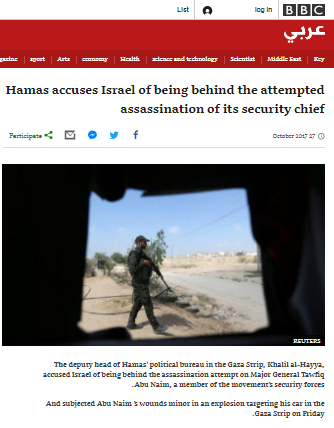The January 12th edition of the BBC Radio 4 programme ‘Broadcasting House’, hosted by Paddy O’Connell and available here, includes (from around 28:00) a contribution by the BBC’s Middle East Editor Jeremy Bowen on the subject of Ariel Sharon who had died the previous day.
O’Connell introduces the item thus:
“The convoy with Ariel Sharon’s coffin has in fact just arrived at the Israeli parliament – the Knesset – where his body is now being moved to a podium. Israelis will be able to pass by to pay their last respects. The funeral of Areil Sharon takes place tomorrow in his family farm close to Gaza as we’ve been hearing in the news. World leaders will attend a ceremony although President Obama is not going; his vice president will represent the USA.”
Before informing listeners of any Israeli reactions to the news of Sharon’s death, O’Connell – in line with much of the rest of the BBC’s coverage of the subject – then finds it necessary to tell them what the Palestinians think of the death of somebody else’s former prime minister.
“Palestinians see Ariel Sharon as a criminal and have condemned his record. As for Israelis, they will have their chance to pay their respects as his body lies in state in Jerusalem. Well I’ve discussed this with the BBC’s Middle East Editor Jeremy Bowen.
Bowen begins:
“Now he hasn’t been a political factor of course in eight years. Israelis are very good at absorbing shocks and they did that in 2006 when he had his stroke and went into a coma. But he’s a very symbolic character as far as Israelis are concerned. He goes right back to their independence war in 1948; he fought in that and was wounded. Shimon Peres the former prime minister, now the president, who was a politician right back in 1948 himself, gave this tribute.”
Listeners then hear a recording of Shimon Peres speaking in English, after which O’Connell says:
“It’s notable when you look at the tributes that have come in – if you compare this to what happened when Yitzhak Rabin was assassinated, when Yasser Arafat paid tribute and himself went to a commemoration for the assassinated prime minister – this is not the case at all this time round.”
Bowen: “Yeah. Rabin was seen as a tough guy, a military commander who had – from the Palestinians’ point of view – certainly from Arafat’s point of view – who had changed. Ariel Sharon – as far as the Palestinians were concerned – was never going to change. 1982 Sharon as Defence Minister presided over an invasion of Lebanon. During the siege of Beirut there was a terrible massacre of Palestinians in a refugee camp. Hundreds dead – maybe thousands dead. Now they were killed by Lebanese Christian militiamen who were in alliance at the time with the Israelis and there was an official inquiry into all this afterwards in Israel itself. That commission of inquiry found that Sharon was personally responsible and he was forced to resign as Minister of Defence.” [emphasis added]
Bowen’s account – and his implication that Sharon was found to be responsible for the massacres themselves – is of course not accurate. The Kahan Commission in fact found that Sharon (and others) bore indirect personal responsibility for not anticipating the possibility of Phalangist violence.
“On 7 February 1983 the Kahan Commission published its recommendations: Report of the Commission of Inquiry into the Events at the Refugee Camps in Beirut. The report attributed direct responsibility for the massacre to the Phalangists. However, the commission determined that indirect personal responsibility fell on several Israeli office holders. It stated that: “in our view, everyone who had anything to do with events in Lebanon should have felt apprehension about a massacre in the camps, if armed Phalangist forces were to be moved into them without the IDF exercising concrete and effective supervision and scrutiny of them “.”
Not content with misleading listeners on the findings of the Kahan Commission, Bowen goes on to present a recording which he has clearly selected in order to advance the impression he wishes to create. 
Bowen: “From the Palestinian point of view it made the man [Sharon] absolutely beyond the pale as far as they were concerned. And they are still very angry about what happened there. There are memorials there to the people who died and one of the survivors of the massacre – a man called Mohammed Srour spoke about that and he said that he wished Mr Sharon had been punished for his actions.”
Listeners then hear a recording of Mohammed Srour speaking in Arabic, with a BBC translation overlaid.
Srour: “Sharon has passed away but we didn’t wish him to die in such a way. I am one of the victims whose parents died in the Sabra and Shatila massacre. I was hoping he would be killed by the hand of a Palestinian child or a Palestinian woman because when he entered Sabra and Shatila and carried out the massacre, he killed the children and the women.”
Of course Sharon did not enter Sabra and Shatila and did not carry out the massacre, but neither Bowen nor O’Connell make any subsequent effort throughout the whole of the rest of the item to correct the misleading impression created by the interviewee Jeremy Bowen deliberately chose to showcase.
Notably, given Bowen’s introduction to the interview with Srour, we can apparently conclude that the latter’s call for the murder of Ariel Sharon “by the hand of a Palestinian child or a Palestinian woman” is what Bowen regards as ‘punishment’.
The BBC’s coverage of Ariel Sharon’s death has included considerable quantities of misleading, inaccurate and defamatory statements by assorted interviewees. The BBC cannot, however, hide behind the claim that these are not the words of its own employees as all BBC produced content is subject to its editorial guidelines.
Related Articles:
BBC’s Knell invents ‘settlements’, amplifies anti-Israel activist
Breaches of editorial guidelines in BBC WS ‘Newshour’ special Sharon broadcast
Loving the hate: BBC coverage of Sharon’s death
Multiple breaches of editorial guidelines in Sharon report by BBC’s Paul Adams
BBC exploits Sharon’s death for more promotion of second Intifada falsehood





